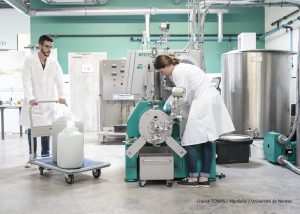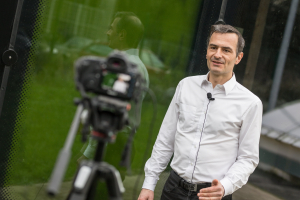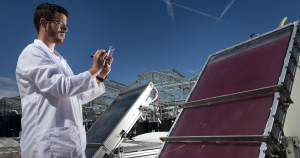Purifying an active substance for the perfume industry
Gilson chose Capacités to prepare an active substance intended for the perfume industry.

Key words
Linked expertise
“CPC would result in a fourfold reduction in the amount of solvent used, while achieving purity levels equivalent to those attained with CCD.”
What issues prompted you to seek an R&D partner?
We would like to change our purification technique since CCD (Countercurrent Distribution) isn’t particularly productive and requires a great deal of undesirable organic solvent. The advantages of CPC (Centrifugal Partition Chromatography) are twofold: a drastic reduction in both the amount of solvent used, as well as in the length of the purification process.
Before implementing CPC on an industrial scale, we needed to establish proof of concept up to a pilot scale.
Why did you entrust the feasibility study for this new purification method to Capacités?
We lacked both the expertise and the equipment for an in-house change. Capacités, backed by the GEPEA Laboratory of the University of Nantes in terms of technical resources, is well equipped when it comes to purifying a wide range of products via CPC. Above all, they are entirely proficient in scaling up a validated CPC method from a laboratory to an industrial level.
What were your findings?
The feasibility study and subsequent scale-up testing showed that CPC could indeed replace our purification technique quite successfully. CCD, albeit obsolete, purifies our raw products extremely well. CPC would result in a fourfold reduction in the amount of solvent used, while achieving purity levels equivalent to those attained with CCD. That’s a huge amount. To give you an idea, we use 400 L of chlorinated solvent to purify 1 kg of material, as opposed to 100 L for 1 kg today. This drastic reduction would also considerably improve the process from a HSE point of view.
The conversion to CPC would also allow us to automate the purification process, which was manual, and to free up space since CPC columns are much smaller than CCD equipment.
How would you sum up your experience of working with Capacités?
If I were asked to work with them again, I wouldn’t think twice about it. Over and above their technical capabilities, we appreciated the dedication of Capacités’s experts. They didn’t hesitate to go over to our premises in Belgium and to the University of Reims, which also has a CPC research team, in order to carry out their tests.
I will be calling on Capacités again to assist us with the next phase of this project: implementing the CPC industrial scale-up.
We wish to thank Laurent Petit for this testimonial.
OUR PROJECTS
These projects may also interest you

Gilson chose Capacités to prepare an active substance intended for the perfume industry.

Capacités was entrusted for the implementation of the biorefinery process, as well as scaling it up for routine.

An interview with the co-founder and CEO of AlgoSource

ezCOL BV called upon experts in bioprocess engineering from Capacités to scale up the microalgal biomass production and provide the volume necessary for a clinical trial.
This site uses cookies and gives you control over what you want to enable